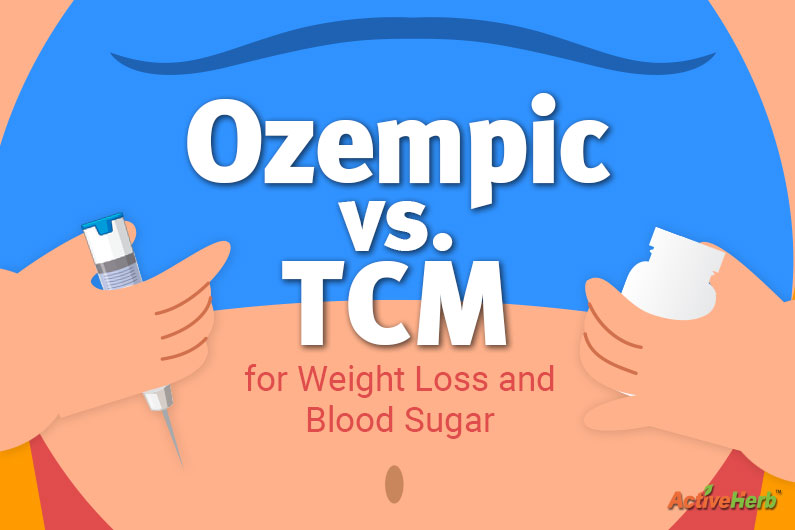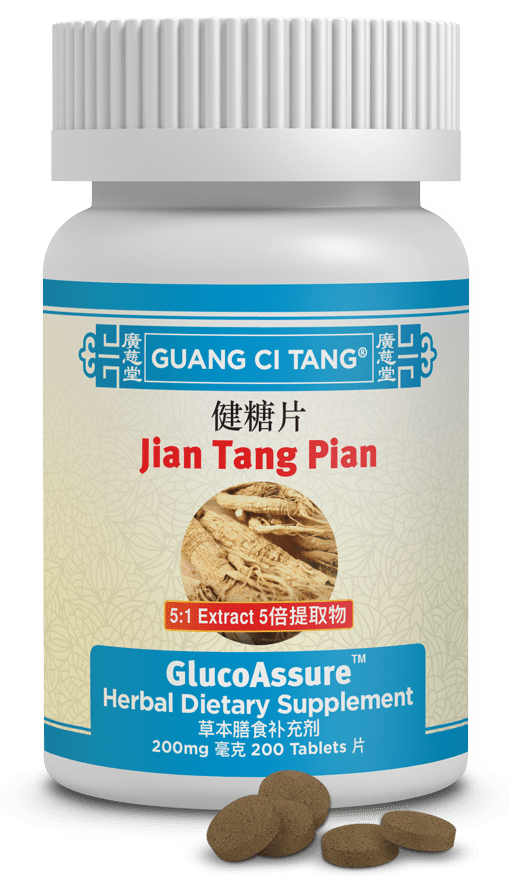Ozempic vs. TCM for Weight Loss and Blood Sugar

Ozempic might be Hollywood’s favorite weight loss secret, but there’s a more time-tested option that doesn’t require a prescription. In the latest ActiveHerb.com blog post, we compare GLP-1 drugs like Ozempic to Traditional Chinese Medicine for supporting weight and blood sugar balance. Spoiler alert: One path is synthetic and fast-acting, the other is rooted in ancient wisdom.
Unless you’ve been living in the wilds of Borneo…
…you’ve probably heard of GLP-1 agonist drugs. Think: Ozempic, Wegovy, Mounjaro, and Rybelsus. They’ve become pop-culture buzzwords, appearing in celebrity gossip magazines, late-night monologues, and even Oscar red carpet interviews. These drugs were initially developed to help manage type 2 diabetes—but their sudden rise to fame comes from a different use: rapid weight loss.
If you’re thinking about trying one but are curious about natural alternatives, Traditional Chinese Medicine (TCM) may offer a smarter long-term strategy for managing both weight and blood sugar.
But first, a quick disclaimer…
GLP-1 agonists like Ozempic are prescription medications. You should only take them under a licensed healthcare provider’s supervision. This article isn’t intended to be medical advice—it’s a side-by-side comparison to help you better understand your options.
Understanding GLP-1 Agonists: How Do They Work?
GLP-1 agonists such as Ozempic mimic the glucagon-like peptide-1 hormone. Glucagon is a hormone the pancreas produces that regulates blood sugar levels by secreting insulin. GLP-1 also regulates appetite. By activating GLP-1 receptors, these medications enhance insulin release, suppress glucagon secretion, and slow gastric emptying, reducing appetite and food intake.
In other words, think of a GLP-1 agonist as a “fake fullness” switch for your body. Medications like Ozempic mimic this hormone, signaling your brain that you’re full and slowing down how fast your stomach empties food. It’s like having a dimmer switch on your hunger… turned all the way down.
While this can reduce food intake, it also means you might be eating far less than your body needs—especially in terms of nutrients.
When you’re not eating much because your brain doesn’t get a strong signal to eat, that’s good for the number on the scale. However, it also results in decreased consumption of essential nutrients, as the diminished appetite can lead individuals to opt for quick, energy-dense snacks over balanced, nutrient-rich meals.
Some users of GLP-1 agonists may even adopt fasting-mimicking diets, consuming as little as 500 calories daily, which can trick the body into a starvation mode; however, the lack of appetite induced by GLP-1 agonists may drive cravings for sweets and other non-nutritive foods, potentially leading to nutritional deficiencies.
A Brief History of GLP-1 Agonists
Semaglutide, marketed as Ozempic, received FDA approval in December 2017 for the treatment of type 2 diabetes. Recognizing its potential for weight management, the FDA approved a higher-dose version under the brand name Wegovy in June 2021 for chronic weight management in adults with obesity or overweight conditions.
The popularity of these medications has surged, with semaglutide ranking as the 48th most commonly prescribed medication in the United States in 2022, accounting for over 13 million prescriptions. This heightened demand led to shortages, prompting the FDA to address supply issues and clarify policies for pharmacy compounders.
Potential Side Effects of GLP-1 Agonists
While effective in weight loss and blood sugar management, GLP-1 agonists are associated with several side effects, including:
- Nausea and vomiting
- Diarrhea or constipation
- Loss of appetite, potentially leading to nutrient deficiencies
- Delayed gastric emptying (gastroparesis), where the stomach empties too slowly
- Fatigue and gallbladder issues
It’s crucial to consult with a healthcare provider to weigh these risks against the benefits.
Traditional Chinese Medicine’s Perspective on Weight Gain and Blood Sugar Imbalances
According to a 2023 Frontiers in Endocrinology study, TCM attributes weight gain and blood sugar imbalances to:
- Spleen Qi Deficiency: The Spleen is central to digestion and nutrient assimilation. A deficiency can lead to poor digestion, resulting in Dampness accumulation, which manifests as weight gain and lethargy.
- Dampness and Phlegm Accumulation: An imbalanced diet and sedentary lifestyle can cause Dampness, leading to the formation of Phlegm—a pathogenic factor contributing to obesity and metabolic disorders.
- Liver Qi Stagnation: Stress and emotional disturbances can cause Liver Qi stagnation, disrupting the flow of energy and affecting the Spleen’s function, leading to digestive issues and weight gain.
- Kidney Deficiency: The Kidneys are vital for metabolism and energy. A deficiency, often due to aging or chronic illness, can impair metabolic processes, contributing to weight gain and insulin resistance.
How Do Chinese Herbs Support Weight and Blood Sugar Management?
Chinese herbal medicine aims to restore balance and harmony within the body, addressing the root causes of weight gain and blood sugar imbalances:
- Transforming Dampness and Phlegm: Herbs that resolve Dampness help reduce excess weight and improve metabolism.
- Strengthening Spleen Qi: Tonifying herbs enhance digestive function, ensuring proper nutrient absorption and energy production.
- Regulating Liver Qi: Herbs that soothe the Liver alleviate stress-related eating and promote emotional well-being.
- Nourishing Kidney Essence: Herbs that tonify the Kidneys support metabolic functions and hormonal balance, crucial for maintaining healthy weight and blood sugar levels.
Side Effects of Chinese Herbs? Not So Fast
TCM is famous for its individualized approach and safety when prescribed correctly. ActiveHerb.com takes that commitment a step further with:
- Rigorous batch testing for contaminants and heavy metals
- GMP-certified manufacturing standards
- Full transparency and traceability of herbal ingredients
- Trusted by tens of thousands of licensed acupuncturists nationwide
See our Quality Assurance for more bragging rights.
Top Chinese Herbal Formulas for Weight and Blood Sugar Support
Here are some of the most popular formulas available on ActiveHerb.com:
For blood sugar management, look no further than:
- Jian Tang Pian (GlucoAssure™) – Works holistically to support blood sugar levels already within a healthy range, by, according to TCM principles, nourishing Yin, tonifying Qi, generating body fluids, and clearing heat.
For weight management support, ActiveHerb.com offers a few options:
- Slimin is a best-seller and part of ActiveHerb’s Modern Essentials brand. It works by expelling phlegm and dampness, as well as supporting normal water metabolism and fat metabolism. Unlike GLP-1 agonists, ActiveHerb’s Slimin also supports:
- Energy levels
- Digestion
- Immune Function
- Cholesterol levels (in people with already normal levels)
- Fang Feng Tong Sheng Pian (Weitalite™) – Like a safe, gentle, natural cleanse and detox. Supports youthful looking skin by opening the pores to expel metabolic waste. In the process of doing so, it acts as a metabolic reboot, making metabolism more effective.
- Wu Ling Pian (Wateroff™) – If your weight gain is caused primarily by water retention, get Wateroff. It addresses the root cause of water accumulation and dampness in the interior. More efficient water metabolism more effective weight management.
- Qing Ti Tong Sheng Pian (Weitaless™) – A modified form of Weitalite, Weitaless is more gentle formula. It induces sweating to release toxins from the skin, resolves food stagnation, and is suitable for those with heavy appetites. And like Wateroff, it promotes water metabolism.
Ozempic vs. Herbs for Weight Loss: Which Path Is Right for You?
GLP-1 agonists like Ozempic offer a quick fix—but at a steep financial and physiological cost. If you’re seeking a more holistic and balanced approach to weight and blood sugar, Traditional Chinese Medicine offers time-tested herbal support with fewer risks.
Whether you’re under the care of a physician for blood sugar management or simply seeking to feel better in your body, ActiveHerb.com offers herbal formulas designed to nourish—not deprive—your health.






